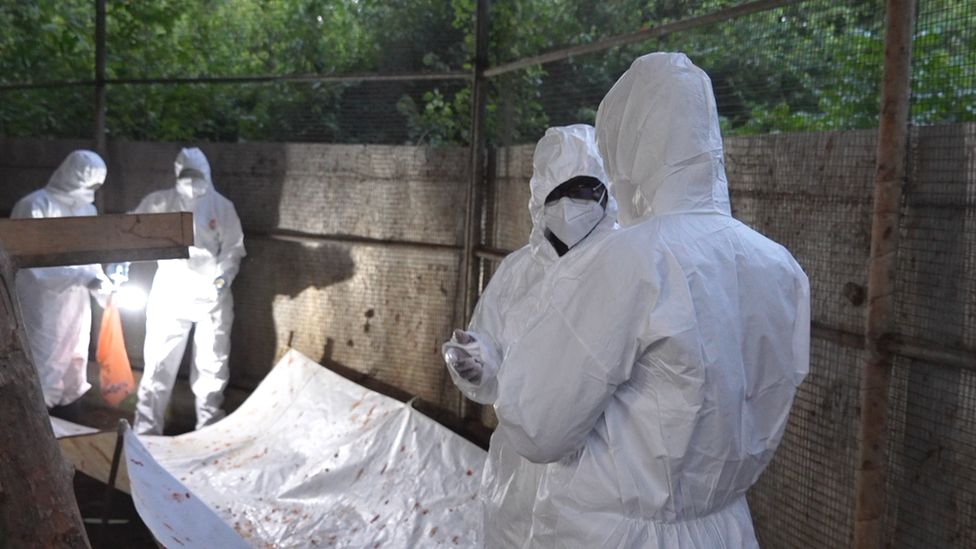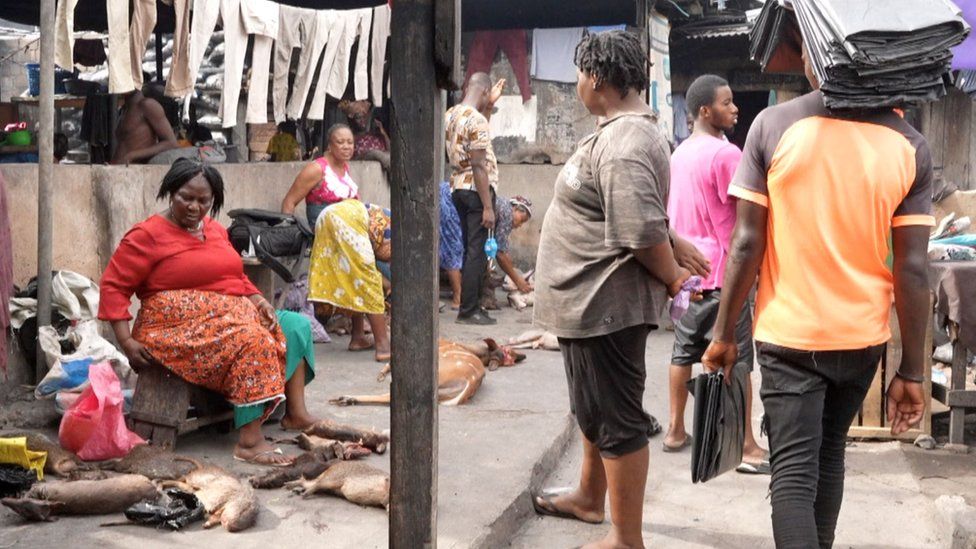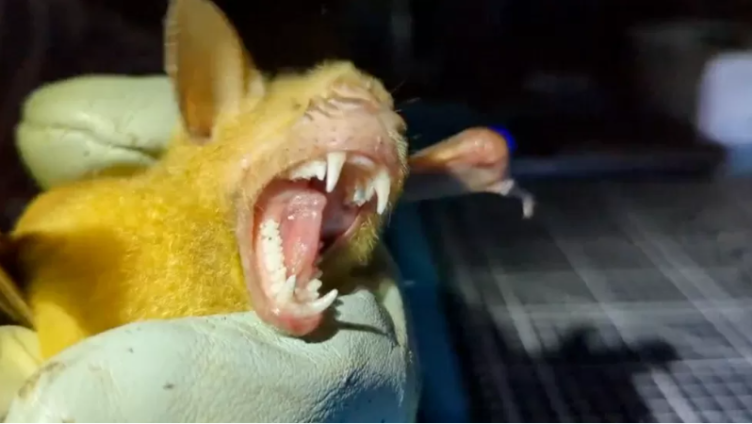Bats are essential to the world's ecosystems, but they are known carriers of several viruses. Humans are increasingly encroaching upon their habitats, adding to the risk of new pandemics, so scientists are studying bats for any clues about how to prevent any new outbreaks.

Dusk is the witching hour at Accra Zoo. It is the time that the captive colony of straw-coloured fruit bats begin to stir and the best time they can be tested for different pathogens.
A team of scientists from the University of Ghana's veterinary school is here to analyse the bat droppings, or guano.
They are involved in an international effort to predict the next pandemic and even in the extreme heat of Ghana's rainy season, they dress up in full PPE. They enter the enclosure and spread a white tarpaulin out on the ground.
Lead scientist Dr Richard Suu-ire has studied bats for many years. He explains that PPE is needed "to protect you from any infection you may pick up within the cage but also to protect the bats from getting anything from us. So it's protection both ways."
Much remains a mystery about these animals - the only mammals that fly - and their extraordinary immune systems. Somehow bats can carry many viruses but don't seem to get sick themselves.
Ghana has joined countries like Bangladesh and Australia as part of a global project called Bat OneHealth, which investigates how pathogens are transmitted from one species to another and what can be done to prevent so-called spillover events.
In light of the Covid pandemic, the bat-borne viruses being focused on in this research include coronaviruses.
Warning: This article contains a picture of dead animals which some people may find upsetting
Dr Suu-ire explains that they are testing for paramyxoviruses and coronaviruses in the bats. In humans, these viruses are more familiarly experienced as illnesses such as mumps, measles and respiratory tract infections.
He describes the bats as "reservoirs" because they carry the infection without getting sick themselves.
"So we want to monitor and see what is going on."
He says when they worked with the wild bat populations they did not detect Covid-19.
Today, his team is also testing for superbugs in the bat droppings. The scientists have fed the bats pawpaw fruit and, once the bats have defecated on the tarpaulin, they take swabs of the bright orange droppings and store them in test tubes.

The University of Ghana has been at the forefront of this new area of research, with this project being the first of its kind. However, there are still many gaps in scientific understanding.
Ultimately, what they are trying to find out is whether there is any bacteria in the bat faeces which is resistant to antibiotics.
Dr Suu-ire says: "If there's any resistance we will then find out to which antibiotics they are developing resistance. In future we will try to isolate the resistant genes from these bacteria."
This is not the only bat research going on at the University of Ghana.
In the undergrowth of the university's botanical gardens, Dr Kofi Amponsah-Mensah is setting up a high green net, almost as if he is ready for a night-time game of badminton.
These nets allow him to catch some bats temporarily which he then examines, measures and finally releases back into the wild. As an ecologist, he worries about how humans are increasingly encroaching into bat habitats.
He points out that deforestation rates in Ghana are high, with a lot of mining destroying vegetation which is the bats' natural habitat.
"I think we are just using bats as scapegoats for areas where we have failed as people, because historically we didn't have a lot of these diseases emerging," he says.
"We are the ones encroaching into the bats' [habitat], you know, and messing around with the ecosystem. This obviously leads to more contact and then the likelihood of some of these diseases coming up."
Any discussion of how humans interact with bats inevitably leads to the topic of bushmeat.
All kinds of animals are on sale at a bushmeat market down a disused railway line in central Accra. These markets are a pinch-point where wild animals, like bats, come into contact with people. This creates a risk these scientists want to get ahead of.
It is certainly not a place for the faint-hearted. There are large rodent-type animals called grass cutters with long tails, and dead antelopes with their throats slashed - signs of the various ways in which they were hunted in the wild.

The heat in the market is overwhelming as many of the women who work here are cooking on open stoves. In the corner of one stall, we see what looks like a saucepan lid full of shrivelled, straw-coloured fruit bats. According to Dr Amponsah-Mensah, they have been singed on a fire to remove the hair.
Following the Covid pandemic, some experts have called for the banning of markets like these in case they help spread the viruses. Although Dr Amponsah-Mensah says he would not choose to eat bat himself, he feels conflicted about a total ban.
He says that the trade in bushmeat is something that has been going on for thousands of years and that it's entrenched in people's cultures and histories, with many people preferring to eat bushmeat rather than beef or chicken.
"The trade is dominated mostly by women and for a lot of them, this is the only trade they know because it's been handed down from their grandparents to their mothers, and now they are in the trade as well," he says.
"So any attempt to ban bushmeat without really thinking about the complexity of the trade will really have serious implications."
At the sterile high-security labs at the Noguchi Institute for Medical Research on the University of Ghana's campus, bat droppings from Accra Zoo will be analysed by Associate Professor of Virology Kofi Bonney.
As he punches a secret code into an electronic keypad, he explains that these labs have negative air pressure to prevent any pathogens escaping.
Since the pandemic, Prof Bonney and his team have found themselves busier than ever in the global effort to get ahead of any future virus outbreaks.
Prof Bonney explains the growing relevance of the Bat OneHealth project: "We should have the environment working together with the animals' sector and the human sector. We must set up systems that will pick up some of these viruses very early so that we can curtail the spread.
"Otherwise, once a virus inhabits the human system, it keeps circulating and there is a high tendency for the virus to change. As they change, they can develop the ability to become a more severe disease. So the best thing is for us to develop systems that can pick them up early."
Experts worry that the frequency of zoonotic spillovers will increase with climate change. Humans and animals will be forced into ever closer contact as they both vie for resources such as water and even shade from the sun.
Bats are already the focus of billions of dollars-worth of research - partly because of their unusual immune systems but also because they can fly such long distances. Understanding them better, as they are trying to do in Ghana, will be crucial to the planet's health.
Latest Stories
-
‘Shocking and excessive’ – Lawyer challenges $18m verdict in Anas-Kennedy Agyapong case
28 seconds -
Parliament approves GH₵2.8bn for road maintenance
16 minutes -
Minority Chief Whip raises concerns over ambiguities in Gold Board bill
1 hour -
Mahama warns leaders against ‘decisions that kill’ after debt crisis claims lives
1 hour -
Wisconsin Attorney General sues to block Elon Musk $2m election giveaway
1 hour -
Disney faces US investigation over DEI practices
1 hour -
Hair relaxers linked to increased breast cancer risk in Ghanaian women
2 hours -
Columbia University president resigns amid Trump crackdown
2 hours -
CJ removal petition: Citizens must not sit back and watch politicians to get their way – NPP MP
2 hours -
Thousands gather to bid farewell to ageless Ga music icon Naa Amanua Dodoo
2 hours -
From despair to hope: Khadijah Bawuma receives life-changing scholarship after Myjoyonline report
2 hours -
Mob kills seven suspected kidnappers in Nigeria’s Edo state
3 hours -
Joseph Paintsil to make injury comeback after six weeks out
3 hours -
14 arrested over missing ECG containers at port
3 hours -
Energy Minister demands forensic audit over missing ECG containers
3 hours

